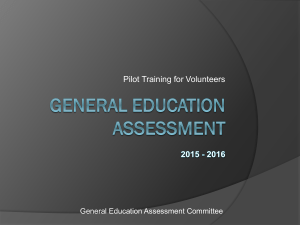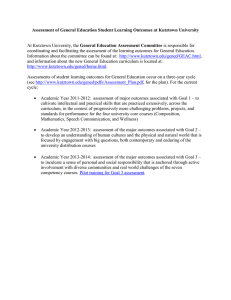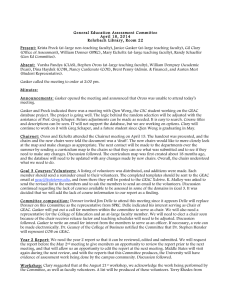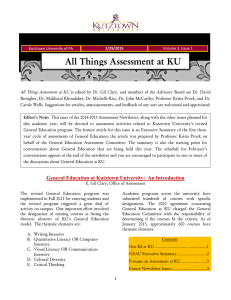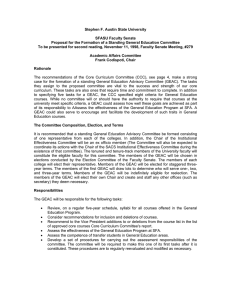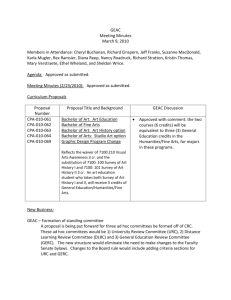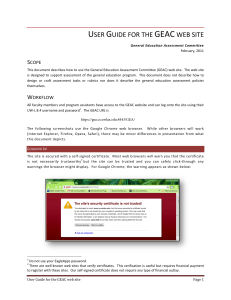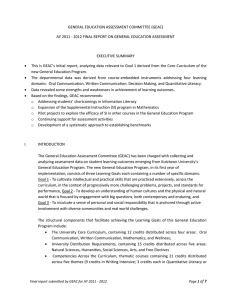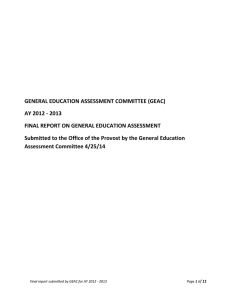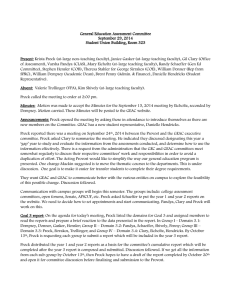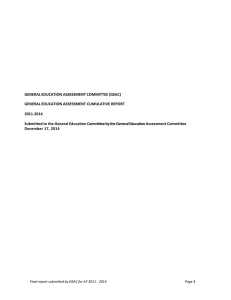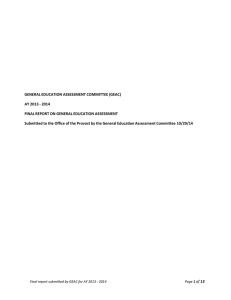ALL THINGS ASSESSMENT AT KU
advertisement
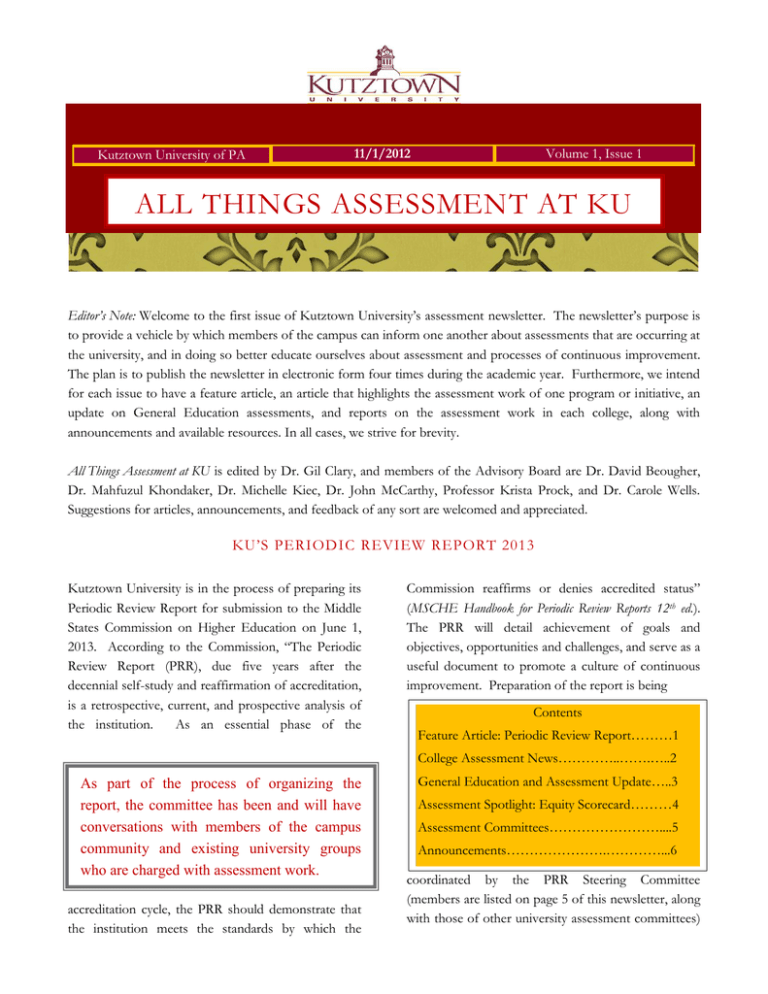
Kutztown University of PA 11/1/2012 Volume 1, Issue 1 ALL THINGS ASSESSMENT AT KU Editor’s Note: Welcome to the first issue of Kutztown University’s assessment newsletter. The newsletter’s purpose is to provide a vehicle by which members of the campus can inform one another about assessments that are occurring at the university, and in doing so better educate ourselves about assessment and processes of continuous improvement. The plan is to publish the newsletter in electronic form four times during the academic year. Furthermore, we intend for each issue to have a feature article, an article that highlights the assessment work of one program or initiative, an update on General Education assessments, and reports on the assessment work in each college, along with announcements and available resources. In all cases, we strive for brevity. All Things Assessment at KU is edited by Dr. Gil Clary, and members of the Advisory Board are Dr. David Beougher, Dr. Mahfuzul Khondaker, Dr. Michelle Kiec, Dr. John McCarthy, Professor Krista Prock, and Dr. Carole Wells. Suggestions for articles, announcements, and feedback of any sort are welcomed and appreciated. KU’S PERIODIC REVIEW REPORT 2013 Kutztown University is in the process of preparing its Periodic Review Report for submission to the Middle States Commission on Higher Education on June 1, 2013. According to the Commission, “The Periodic Review Report (PRR), due five years after the decennial self-study and reaffirmation of accreditation, is a retrospective, current, and prospective analysis of the institution. As an essential phase of the Commission reaffirms or denies accredited status” (MSCHE Handbook for Periodic Review Reports 12th ed.). The PRR will detail achievement of goals and objectives, opportunities and challenges, and serve as a useful document to promote a culture of continuous improvement. Preparation of the report is being Contents Feature Article: Periodic Review Report………1 College Assessment News…………..…….…..2 As part of the process of organizing the report, the committee has been and will have conversations with members of the campus community and existing university groups who are charged with assessment work. accreditation cycle, the PRR should demonstrate that the institution meets the standards by which the General Education and Assessment Update…..3 Assessment Spotlight: Equity Scorecard………4 Assessment Committees……………………....5 Announcements………………….…………...6 coordinated by the PRR Steering Committee (members are listed on page 5 of this newsletter, along with those of other university assessment committees) and will include conversations with members of the campus community and existing university groups who are charged with assessment work. Because the PRR is an analysis of where we are, where we have been, and where we are going, the major chapters are devoted to: have made had a positive impact on student learning. We will complete our assessment of all MBA goals this academic year, and will continue to make changes to the curricula and courses as warranted. College of Education Over the past 18 months, the College of Education has been conducting the self-study in preparation for our NCATE re-accreditation, and as part of this work we have developed all of our program assessments based on the College of Education’s Conceptual Framework “Teacher as a Lifelong Learner” (see http://www2.kutztown.edu/academics/colleges-anddepartments/education/teacher-as-a-lifelonglearner.htm ). The Conceptual Framework represents the shared vision of the College of Education of preparing educators to work effectively in P-12 schools, and provides our high expectations for their role in leading educational excellence. The Conceptual Framework incorporates Elements, or candidate proficiencies, and elements are categorized under three Domains: Knowledge, Skills, and Dispositions. The college appropriately assesses candidate performance, knowledge, and pedagogy under this framework by way of the following: Knowledge Domain - Communication, Critical Thinking; Skills Domain - Interpersonal Skills, Integration responses to the recommendations made by the Middle States evaluation team and the KU self-study team during the 2008 decennial review perceptions of the most important challenges and opportunities facing KU in the next five years trends and projections related to enrollment and finances processes for assessing, in an organized and sustained manner, institutional effectiveness and student learning outcomes analysis of processes for planning and budgeting, and how the two are linked Open forums will be held in early Spring semester to provide opportunities for feedback on the draft document. College Assessment Committee News College of Business The Department of Business Administration continues to work diligently on continuous improvement to its curriculum, which is one of the requirements of the current AACSB standards. The effort began in 2009 by establishing learning goals for the BSBA and MBA programs, continued with developing curriculum maps for both programs, and progressed with significant revisions to both programs to align the program requirements to the learning goals. These changes included adding requirements to the program while simplifying the curricula in all the majors. Currently, all goals of the BSBA program have been assessed at least once using direct measures of student learning. We have made additional changes to courses on the basis of those data. For some goals, we are beginning to assess whether the changes we of Discipline, Technology Integration, Organization and Classroom Management; and Dispositions Domain - Scholarly Inquiry, Reflective Wisdom, Cultural Awareness and Acceptance. The NCATE site visit team will be on campus April 21 – 23, 2013. College of Liberal Arts & Sciences The College of Liberal Arts and Sciences’ Assessment Committee continues its involvement with the university’s General Education Assessment Committee. In a coordinated effort, volunteers from the college have participated in training sessions that prepare them to assess General Education Goal 2, the second iteration of General Education assessments, 2 covering a broad range of classes from disciplines within the college. In addition to General Education assessment efforts, members of the committee, at the direction of the dean of the college, have begun an examination of high impact practices conducted in liberal arts and sciences classrooms at Kutztown as well as studying freshman engagement. Committee members are collecting information about efforts that influence student retention and persistence. Over the academic year, the committee intends to look at resources at the department, college and university level that would be needed to potentially increase both retention and persistence rates. to be a music educator?” They believe students should be versed in the language of teaching from the very first semester, and they should be assessed on the qualities and attributes that are expected of an educator. The music faculty developed a rubric of nine dispositions that include musical skills, communication skills, professional growth, personal attributes, and ethical behaviors. Freshmen music education majors examine these dispositions in the course Overture to Music Education. They are then evaluated on their progress by a faculty panel at a Mid-Tier Assessment during the spring of their sophomore year. Lastly, students demonstrate mastery of these dispositions during their senior year Clinical Experience, as they model the dispositions for students in the K-12 setting. The music faculty have assessed the first cohort, and are currently making procedural changes, in order to ensure the best possible student experience. College of Visual & Performing Arts The College of Visual and Performing Arts’ update features a snapshot of a best practice in assessment from one of our departments. The Music Department has been examining the question “What does it mean General Education and Assessment Update The General Education Assessment Committee (GEAC) is charged with assessing “direct evidence of student learning outcomes of the General Education Program.” This charge forms the basis of the General Education Assessment Plan, which, in addition to the General Education Reform report and proposal, was written by the General Education Task Force and approved by the University Senate, Representative Council and University Curriculum Committee and implemented in Fall 2010. Goal 1: To cultivate intellectual and practical skills that are practiced extensively, across the curriculum, in the context of progressively more challenging problems, projects, and standards for performance. Goal 2: To develop an understanding of human cultures and the physical and natural world that is focused by engagement with big questions, both contemporary and enduring. Goal 3: To inculcate a sense of personal and social responsibility that is anchored through active involvement with diverse communities and real world challenges. The General Education Program’s mission is to “cultivate intellectual and practical skills, introduce students to the range of intellectual traditions and perspectives expressed in the disciplines represented by our major programs, educate our students in the knowledge of human cultures and the physical and natural world, and encourage the development of personal and social responsibility.” This mission will be accomplished when students meet the three general education goals: GEAC operates on a three-year cycle. During each year, student progress toward one goal is assessed. The committee is currently in year two of the cycle and assessing student progress related to Goal 2. During year one, courses that addressed the domains/skills of Goal 1 (Inquiry and analysis, decision making, critical and creative thinking, written 3 and oral communication, quantitative literacy, information literacy, teamwork and problem solving, or wellness) were identified by GEAC. Volunteers were identified from the faculty who taught those classes. These volunteers used their own course assessments and submitted the reporting template to GEAC, indicating the number of students who achieved at each of four performance levels; levels ranged from 4 (highest level of achievement) to 1 (lowest). The reporting templates served as a rubric for that skill area. Faculty used the provided rubric or used their own rubric and shared it with GEAC. In addition to the reporting template, faculty were also asked to discuss their assessment methods, results, and recommendations for how the results could be improved. the Provost that made recommendations on the potential allocation of resources to help improve student outcomes. The GEAC report included suggestions from individual faculty (from the reports submitted to GEAC) when appropriate, and also, using the benefit of a compilation of data, made recommendations of its own. In the third year of the cycle the GEAC will have the opportunity to make recommendations for improvement to the General Education Program. These changes would have to be approved by the three University bodies that approved the initial General Education Reform. GEAC is in the process of writing their own newsletter which will provide more details about their assessment process and a timeline of activities for the coming year. These reporting templates were collected by GEAC and the data was compiled for each domain and then analyzed. For example, data from several courses may be available for student writing. These data were analyzed to identify student progress toward this domain of Goal 1. A written report was submitted to Assessment Spotlight: Equity Scorecard Through the 10-member Kutztown University Evidence Team, Kutztown University is engaged in a two year project that is devoted to reducing the gaps in the educational achievements of under-represented minority students. The over-arching goal of the project is to realize equity in the recruitment and enrollment, retention and persistence, graduation, and quality of educational experiences of these underrepresented students. The project is being conducted with the guidance of the Center for Urban Education at the University of Southern California. graduation), and Quality (i.e., types of educational experiences). For each of these four areas, the Evidence Team sifts through institutional evidence that speaks to the area, and seeks to uncover opportunities for and barriers to achieving the equity goals. Based on the evidence, analyses, and interpretations, the team identifies recommendations for actions. In pursuing these project goals, the team is learning about the Center for Urban Education’s theory and practice of change, an action – research model. There are four fundamental principles underlying this work: Over the two years of the project, a significant period of time is devoted separately to Access (i.e., applications – acceptance – enrollment), Retention/Persistence (i.e., continuation from year to year), Completion (i.e., Evidence-based – institutional evidence, broadly defined, is examined in order to understand the equity gaps in Access, 4 Retention/Persistence, Completion, and Quality, and that evidence is then used as the basis for all recommended interventions. Access phase, the team selected as its focal effort the enrollment gap for African American students: according to institutional evidence, African American students’ enrollment rate (26%) was substantially below the enrollment rate for the university as a whole (37% of admitted students enroll), as well as that of Hispanic/Latino students (35%). In examining institutional evidence, the team found that the university has a very complicated process for admitted students to follow and that the process may be experienced as a more significant obstacle for African American students, and in fact, many underrepresented minority students. As a result, the team recommended to the President that the university develop a more streamlined process for students to follow as they move from acceptance by the university to matriculation. As a final point, as often happens with this action – research process, the recommended actions promise to not only benefit under-represented minority students but all students, regardless of race Systems-focused - the team is encouraged to concentrate on institutional systems and processes, and not individuals. Avoid deficit-mindedness – the team is encouraged to shift its focus from student deficits to campus responsibilities, and to avoid blaming individuals and instead examine systems. Small changes add up - in recommending interventions, the team is encouraged to avoid the trap of designing “big programs” with big price tags; alternatively, the team looks for many small changes that in combination can have a significant impact. At this point, the team has completed its work on the Access phase and is beginning to explore the gaps in retention, persistence, and completion. For the and ethnicity. University Assessment Committees Strategic Planning & Resources Committee Paul Ache (Chair), Javier Cevallos, Sandra Chambers, Gil Clary, Elsa Collins, Richard Courtney, James Delle, Camden Delphus (student), William A. Dempsey, William Donner, Christina Ferris, Mitchell Freed, John Green, Deryl Johnson, Mostafa Maksy, Margaret Noel, Mary Ann O'Neil, Jesus Pena, Gerald Silberman, Ed Simpson, Robert Smith, Natalie Snow, Donna Steslow, Carlos Vargas-Aburto, Carol Watson, Carole Wells Middle States Commission Periodic Carole Wells (Chair), Dan Benson, Gil Clary, Elsa Collins, Andrea Review Report Steering Committee Kirshman, Jesus Pena, Matthew Santos, Gerald Silberman, Natalie Snow General Education Assessment Committee Steven Oross (Chair), Gil Clary, William Dempsey, William Donner, Mary Eicholtz, Janice Gasker, Kenneth Long, Patricia Lutz, Varsha Pandya, Krista Prock, Valerie Trollinger, Randy Schaeffer 5 General Education Committee Randy Schaeffer (Chair), David Arndt, Patricia Derr, Ronald Grapsy, Jeff Hall, Andrea Harmer, Mahfuzul Khondaker, Mostafa Maksy, Paul Sable, Carole Wells College of Business Assurance of Learning Committee Eileen Hogan (Chair), Gil Clary, Kathleen Kaminski, Sue Kong, Liaoliao Li, Therese Maskulka, Manash Ray, Shawn Riley, Qian Sun College of Education Debra Lynch (chair), Gil Clary, Kelly Cockrum, Tanya Faust, Patricia Lutz, John McCarthy, Teresa Sychterz, Patricia Walsh-Coates College of Liberal Arts & Sciences Gregory Shelley (Chair), Mohammed Adeel, Andrew Arnold, Marilyn Baguinon, David Beougher, AnnMarie Cordner, Cara Cotellese, Lisa Frye, Jolene Greenberg, Paula Holoviak, Deepak Khanna, Amy O’Brien, Varsha Pandya, Angelo Rodriguez, Jacob Sewall, Robert Ziegenfus College of Visual & Performing Arts Cheryl Hochberg, Todd McFeely, Willis Rapp, Claire Van Ens, John White ANNOUNCEMENTS Save the date: CET/GEAC Workshop – January 24, 2013 New Professional Development Grants for Training Faculty on General Education Learning Outcomes Assessment – deadline November 16, 2012 Faculty of the Future workshop at Bucks County Community College – June 2013 6
